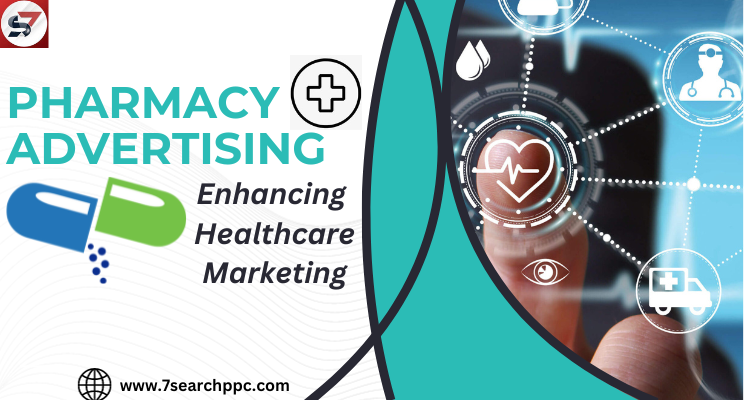 Website Copy Makeover – Turn Visitors into Buyers Instantly!
Website Copy Makeover – Turn Visitors into Buyers Instantly!
AI-Driven EHR: Transforming Healthcare with Intelligent Data Solutions
Written by TeachAhead » Updated on: June 17th, 2025
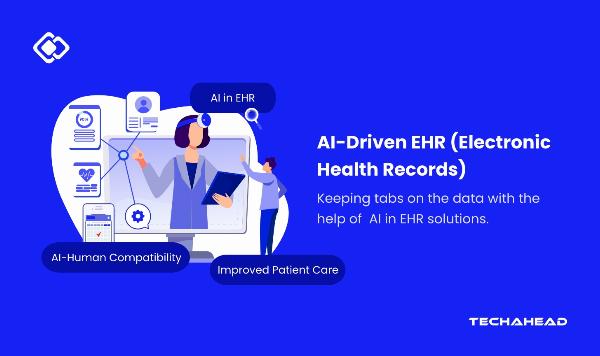
 AI-Driven EHR: Transforming Healthcare with Intelligent Data Solutions
AI-Driven EHR: Transforming Healthcare with Intelligent Data Solutions
Healthcare extends beyond just doctors and patients; even the smallest decisions can impact life or death. Electronic Health Records (EHRs) have revolutionized medical data storage and access, surpassing traditional paper-based systems. However, their evolution continues, accelerating with AI integration.
The global digital health market was valued at USD 240.9 billion in 2023 and is expected to grow at a compound annual growth rate (CAGR) of 21.9% from 2024 to 2030. (Source: Grand View Research)
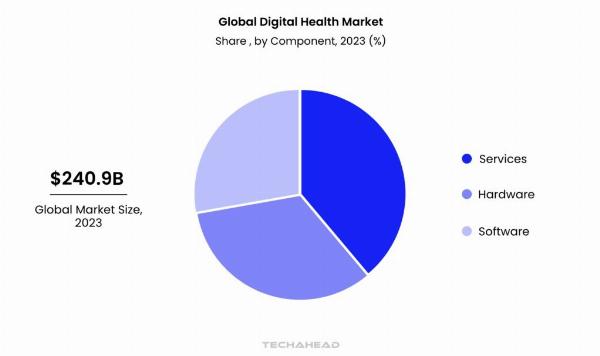
Whether you’re a healthcare professional, a tech enthusiast, or simply curious about how AI is reshaping the healthcare landscape, this post is for you. The goal is to showcase how AI-driven EHRs are revolutionizing the industry and how our expert app development is leading this digital transformation from the ground up.
In this blog, we’ll explore how AI-driven EHRs transform healthcare by enabling smarter patient management, personalized care, and predictive insights that improve patient outcomes. AI is driving a new era in healthcare, shaping how medical professionals approach decision-making and treatment strategies.
- Key Takeaways
AI-driven EHRs are revolutionizing healthcare by enhancing patient management, providing personalized care, and enabling predictive insights that improve outcomes.
Integrating AI into EHR systems unlocks new possibilities in the healthcare sector. It will bring out the best potential from the health professionals and give the best treatments to the patients as well.
However, there are some challenges that also come with data solutions. Suppose, you carry an AI-driven EHR system into your healthcare app development. It will create a better digital environment because it is based on the cloud computing format.
- What are Electronic Health Records (EHRs)?
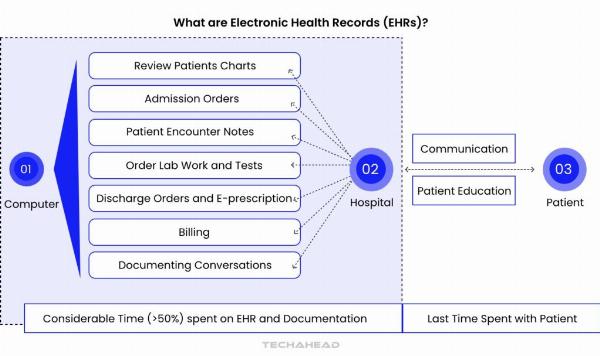
Electronic Health Records (EHRs) are digital versions of a patient’s medical history, health details, and treatment records. These records allow quick access for doctors, treating physicians, and patients. The shift to a digital format, like AI-driven EHR, brings numerous advantages to AI in healthcare, replacing outdated paper-based systems.
AI-driven EHR systems contain extensive information, including patient medical history, allergies, medications, lab test results, imaging reports, vaccination records, and demographic data. This consolidated information enables healthcare providers to gain a comprehensive understanding of a patient’s health. In turn, it allows more precise and informed decisions regarding treatment and care.
A crucial aspect of AI-driven EHR systems is the ability to securely share and access data across different healthcare providers and settings. This sharing fosters improved coordination and communication between teams. As a result, it leads to better care and treatment outcomes for patients.
Additionally, AI-driven EHR systems can automate many administrative tasks. They can analyze patterns in patient data and alert healthcare professionals to potential risks. This further optimizes patient management and enhances the overall efficiency of the healthcare system.
- Role of AI in EHR (Electronic Health Records)
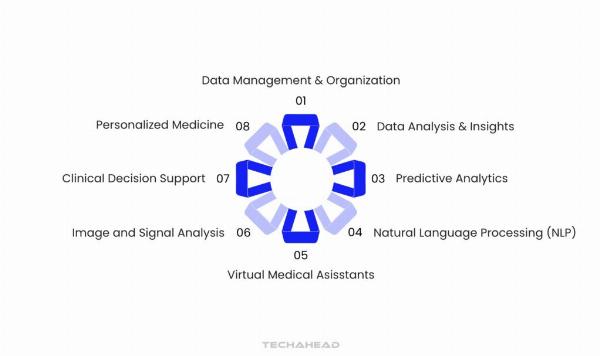
AI is set to revolutionize Electronic Health Records (EHRs), unlocking new opportunities for improving patient care, decision-making, and healthcare processes. An AI-driven EHR system combines vast datasets with advanced algorithms, transforming various aspects of healthcare management.
Data Management and Organization
AI algorithms can categorize and streamline patient data, making it easier for healthcare professionals to access and comprehend critical information.
Data Analysis and Insights
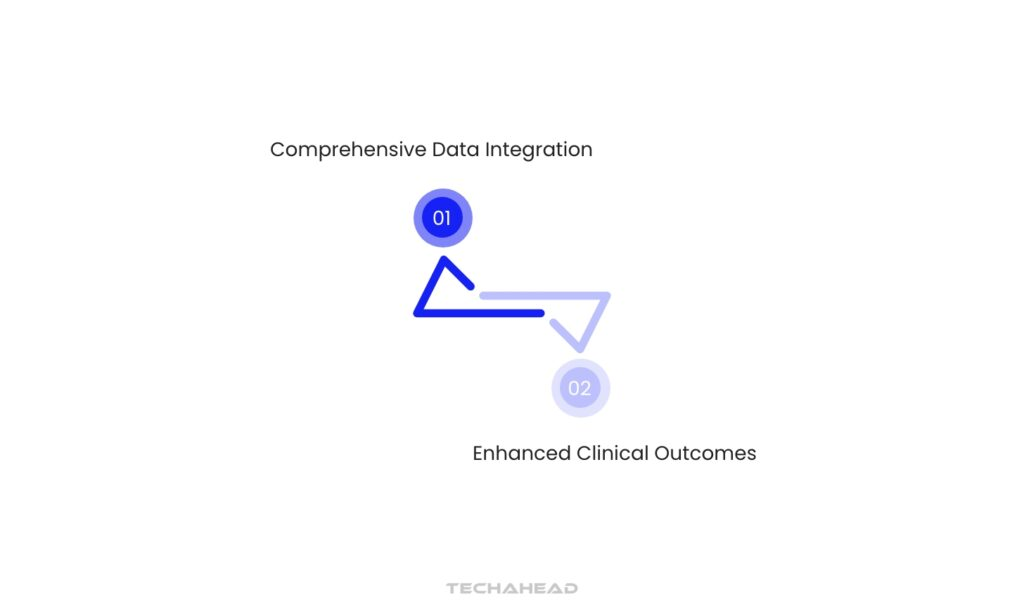
AI-driven EHR systems can evaluate data from multiple sources like medical records, lab results, and genetic data. By identifying patterns, AI helps detect diseases earlier, enhances diagnoses, and enables personalized treatments.
Predictive Analytics
AI can predict patient outcomes by analyzing historical data and risk factors. It highlights individuals vulnerable to specific conditions, allowing proactive interventions and minimizing adverse health events.
Natural Language Processing (NLP)
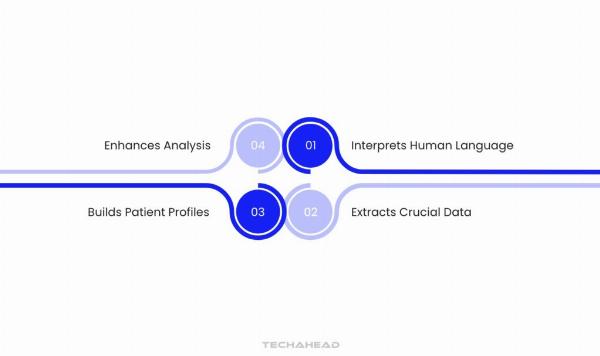
AI’s Natural Learning Processing (NLP) capabilities allow it to interpret human language, extracting essential data from clinical notes and reports. This consolidated information builds a comprehensive patient profile for better analysis.
Virtual Medical Assistants
AI-powered virtual assistants can automate routine tasks like scheduling appointments, updating records, and addressing basic patient inquiries. This automation gives healthcare providers more time to focus on patient care.
Image and Signal Analysis
AI-driven EHRs excel in analyzing medical images, such as X-rays and MRIs, and signals like ECGs. AI algorithms learn from large datasets, improving accuracy and speed in detecting anomalies for diagnosis.
Clinical Decision Support
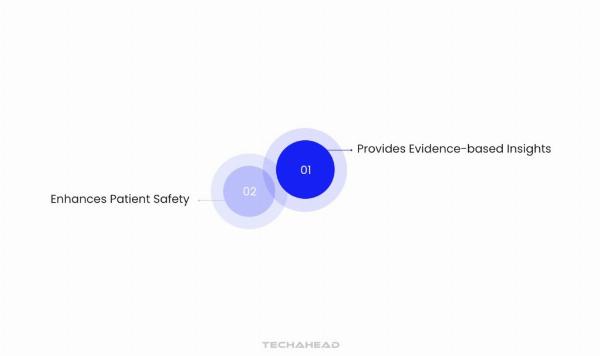
AI-driven EHR systems serve as decision-support tools, providing evidence-based insights to physicians. They recommend diagnoses, and treatment options, and even alert doctors to potential drug interactions or allergies.
Personalized Medicine
AI can create tailored treatment plans based on an individual’s genetics, medical history, and lifestyle. This personalization enhances treatment effectiveness and minimizes adverse reactions.
Although AI-driven EHR systems hold immense promise, challenges like data privacy, algorithm validation, and transparency remain. However, as AI technology matures, these systems will redefine healthcare, making operations smoother and more efficient.
- Challenges to Adopt AI-Driven EHR
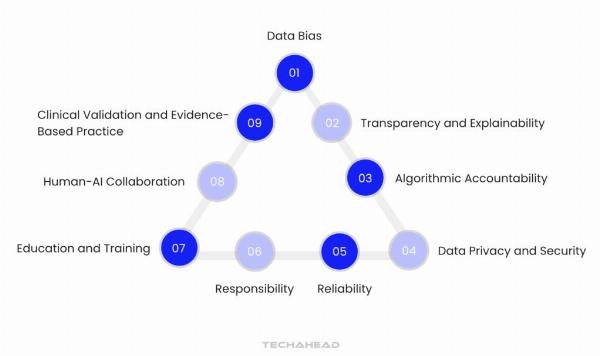
The integration of AI in Electronic Health Records (EHRs) brings numerous advantages, but there are several challenges and barriers that hinder widespread adoption. These include concerns like interoperability between different EHR systems, data privacy, compliance with healthcare regulations such as HIPAA, and resistance from healthcare professionals.
Overcoming these barriers requires robust data governance, standardized interoperability frameworks, and comprehensive training for healthcare providers on AI-driven EHR systems. Let’s explore the key challenges in more depth.
Data Bias
AI-driven EHR systems can face data bias, which occurs when algorithms are trained on historical or incomplete datasets, this can lead to skewed predictions and unequal treatment, especially in underrepresented populations. Addressing this bias is critical to ensuring fairness in healthcare outcomes.
Addressing this bias is critical to ensuring fairness in healthcare outcomes. Healthcare organizations must prioritize the development of inclusive datasets and implement safeguards to detect and mitigate bias. Doing so can lead to more equitable AO-based decision-making and ensure that patient care is not compromised by algorithmic errors.
Reliability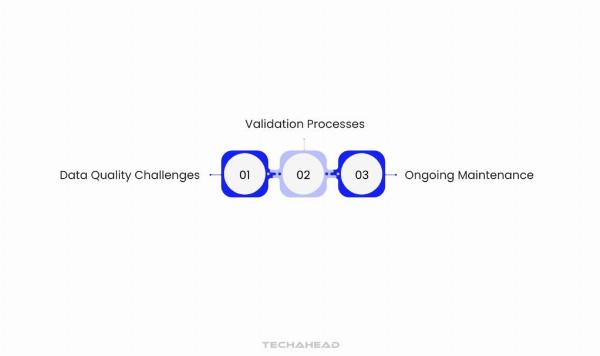
AI-driven EHR systems must be reliable to ensure accurate patient care. Challenges arise from the use of poor-quality or irrelevant data sources, which can lead to eros in AI predictions and recommendations. To address this, healthcare app development should implement robust validation processes to assess the accuracy and relevance of data used by AI algorithms. Regular updates to AI systems and continuous monitoring of their performance are essential for maintaining reliability and trust in AI-powered healthcare app development.
Responsibility
Over-reliance on AI-driven EHR systems can pose risks. While AI enhances healthcare decision-making, it should not replace human judgment.
Healthcare providers must maintain oversight to ensure ethical, patient-centered decisions. AI should function as a tool that complements human expertise, and clinicians should remain actively involved in interpreting AI outputs. Ensuring that AI systems are used as supplementary tools reinforces the importance of human intuition and ethical considerations in delivering quality care.
Data Privacy and Security
AI-driven EHR systems handle vast amounts of sensitive patient information, making data privacy and security paramount. Unauthorized access or breaches can have serious consequences for both patients and healthcare app development.
Healthcare providers must adopt strong encryption measures, secure access controls, and strict compliance with regulations like HIPAA. These precautions help safeguard patient data from malicious threats, ensuring that AI systems operate securely while maintaining trust in digital healthcare solutions.
Transparency and Explainability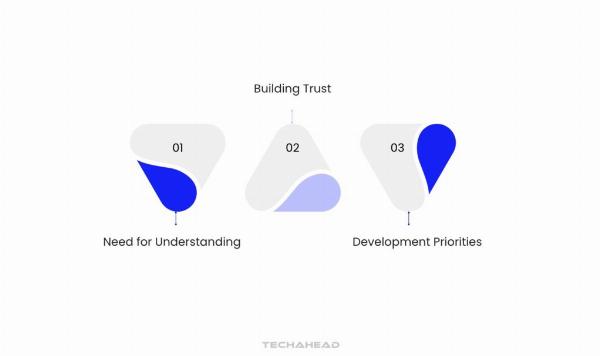
For AI-driven EHR systems to be trusted by healthcare professionals, they must be transparent and explainable. Providers need to understand how Generative AI algorithms render recommendations and make predictions.
Transparent AI systems allow clinicians to assess the logic behind suggestions, enabling informed decision-making. Healthcare organizations should prioritize the development of AI models that are easy to interpret, ensuring that healthcare professionals feel confident using them to support patient care.
Algorithmic Accountability
Accountability is vital in AI-driven EHR systems. Healthcare organizations are responsible for monitoring and evaluating AI algorithms to ensure fairness and equity. Regular audits can help identify and correct biases or errors in AI outputs. Establishing accountability frameworks ensures that AI-driven decisions are consistent with ethical standards and patient safety goals.
Continuous refinement of algorithms, guided by healthcare experts, ensures that AI systems remain reliable and trustworthy in practice.
Clinical Validation and Evidence-Based Practice
Before implementing AI-driven EHR systems, it is crucial to validate these technologies through rigorous clinical trials and peer-reviewed studies. This ensures that AI systems are safe, reliable, and effective in real-world healthcare settings.
Evidence-based practice strengthens the integration of AI in clinical workflows, giving healthcare providers confidence in using these technologies. Ongoing validation processes help refine AI models and maintain alignment with evolving healthcare needs.
Human-AI Collaboration
AI-driven EHR systems are designed to enhance, not replace, human capabilities in healthcare. Successful AI adoption depends on fostering a collaborative environment where AI tools complement the expertise of healthcare professionals. Human oversight ensures that AI-generated insights are applied ethically and safely.
Healthcare providers should retain decision-making authority, using AI recommendations to inform their judgments. Collaboration between humans and AI leads to more comprehensive care and better outcomes for patients.
Education and Training

For AI-driven EHR systems to be effective, healthcare professionals need ongoing education and training. Continuous learning is essential for adapting to advancements in AI technology. Professional development programs should equip providers with the knowledge to integrate AI tools into their practice.
Familiarity with AI systems ensures that healthcare professionals can fully leverage AI-driven insights, improving patient care and keeping pace with the future of healthcare technology.
How Much Does a Custom AI-Based EHR Cost?
Implementing an AI-driven EHR system involves costs that vary based on several factors. These include the complexity of AI algorithms, the size of the healthcare organization, the level of customization, and integration with existing EHR systems.
Costs encompass AI algorithm development, data integration, and a mobile UI design. This also includes thorough testing of the AI-driven solution and ongoing support and maintenance. Additionally, organizations must consider licensing fees for AI technologies and compliance with healthcare regulations, which can further impact expenses.
The true cost of an AI-driven EHR depends on the specific needs of each healthcare institution. Partnering with a specialized mobile app development company can provide tailored estimates based on unique requirements. TechAhead analyzes the scope of the project and delivers accurate cost projections, ensuring the solution aligns with the organization’s needs while adhering to industry standards.
Conclusion
The integration of AI into EHR/EMR systems is an ongoing journey with immense potential to improve patient outcomes and transform healthcare delivery. As AI technology evolves to address past uncertainties, collaboration and innovation will be vital in unlocking its full potential in shaping healthcare’s future. Addressing key challenges like data privacy and algorithmic bias is essential to maximizing AI benefits while minimizing risks.
With expert guidance, healthcare organizations can adopt AI-driven EHR systems that seamlessly work alongside existing IT infrastructure. Integrating AI-based EHR systems with telemedicine, wearable devices, and remote monitoring tools can help create a connected healthcare ecosystem, improving data exchange, care coordination, and population health management.
TechAhead, solution-focused approach has empowered HealthTech companies worldwide to enhance their EHR capabilities with AI and data analytics. Our comprehensive EHR modernization services—from consulting to full integration—help organizations overcome barriers related to time, investment, and infrastructure.
Source URL: https://www.techaheadcorp.com/blog/ai-driven-ehr-transforming-healthcare-with-intelligent-data-solutions/
Note: IndiBlogHub features both user-submitted and editorial content. We do not verify third-party contributions. Read our Disclaimer and Privacy Policyfor details.
Copyright © 2019-2025 IndiBlogHub.com. All rights reserved. Hosted on DigitalOcean for fast, reliable performance.




